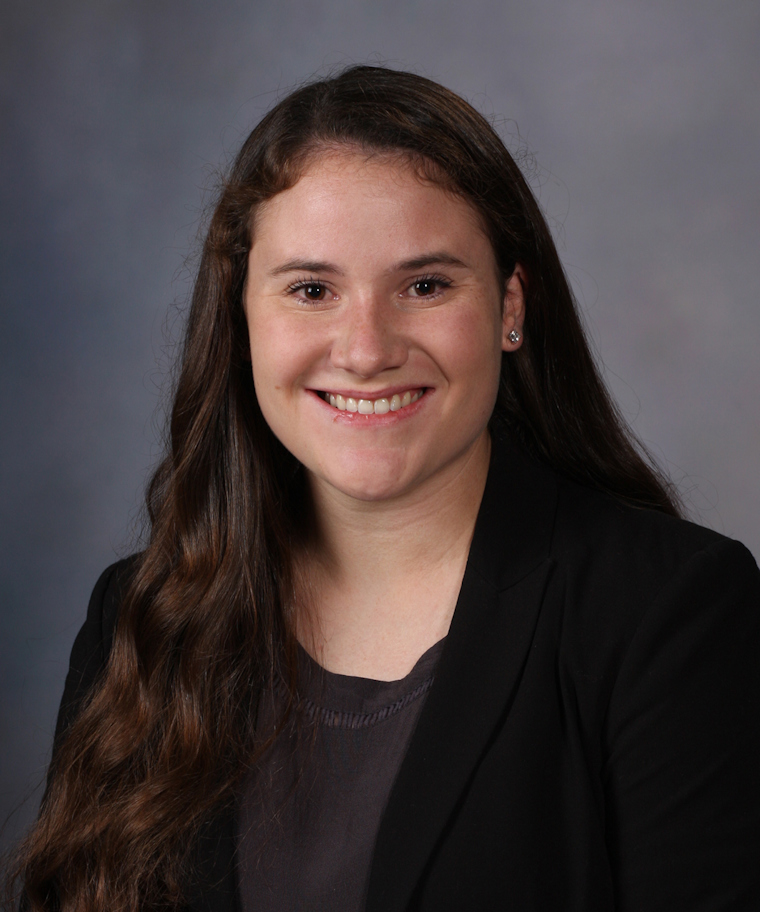This interview is one in a series of interviews with recipients of the 2024 ACGME Awards. The awardees join an outstanding group of previous honorees whose work and contributions to graduate medical education (GME) represent the best in the field. They will be honored at the ACGME Annual Educational Conference, taking place March 7-9, 2024, in Orlando, Florida.
Dr. Elaine Griffeth is an inaugural recipient of the 2024 Lewis Blackman Patient Safety Award that recognizes residents and fellows who have worked to implement strategies to improve the understanding of and show demonstrable improvement in patient safety in their Sponsoring Institution or residency/fellowship program. She is a resident in the joint surgery and thoracic surgery program at Mayo Clinic. Dr. Griffeth described how her desire to help patients in tangible ways led her to pursue a career in general and thoracic surgery. Her project demonstrates how she is already making a difference in the lives of her patients.
ACGME: Why did you want to become a physician?
Dr. Griffeth: It’s such a privilege to be in this role and to train to become a surgeon. I wanted to become a surgeon because I enjoy using my hands to help patients in very tangible ways and working with the health care team to achieve common goals.
ACGME: What, so far, has been the most rewarding part of your residency/fellowship?
Griffeth: The most rewarding part has been seeing the positive impact our operations and peri-operative care have had on patients and their quality of life. I have also enjoyed developing lifelong friendships with my co-residents during our years of learning and training together.
ACGME: What has been the most challenging?
Griffeth: The most challenging aspect is when patients don’t do well post-operatively. These times are very frustrating and painful for patients and the care team.
ACGME: What innovation/improvement did you implement in your program, and how do you see it as improving patient safety in your program/institution overall?
Griffeth: I led a multidisciplinary quality improvement project focused on enhancing the reporting of patient safety events in the nine intensive care units (ICUs) across my institution during 2021-2022. This study was grounded in the DMAIC (Define, Measure, Analyze, Improve, Control) methodology and our intervention phase spanned three months. Key components of this initiative included the creation of a patient safety peer-leadership role, development of a feedback loop, integration of interactive dashboards for monitoring patient safety data, and provision of educational materials via QR codes at workstations. As detailed in our manuscript [Griffeth, Elaine; Gajic, Ognjen; Schueler, Nicole, et al. “Multifaceted Intervention to Improve Patient Safety Incident Reporting in Intensive Care Units.” Journal of Patient Safety. 2023. 19(7), 422-428. doi: 10.1097/PTS.0000000000001151.], these strategies notably enhanced the frequency of reported patient safety events across the ICUs, as well as positively impacted the culture of safety among staff members in the ICUs.
ACGME: What does it mean to you to receive this award - especially in this inaugural year?
Griffeth: It’s very special considering Lewis Blackman’s character and life, as well as the lessons learned from his story. Helen Haskell, his mother, is a passionate and very knowledgeable patient safety advocate and I’m honored to have been selected.
ACGME: What advice would you give to other residents/fellows who are looking to either replicate your improvement or implement an original idea of their own in their own program?
Griffeth: I would encourage them to spend a significant amount of time fully defining the scope of their project (quality gap, location, time, stakeholders, etc.) and designing measurable aims. I would also advise that they identify a faculty member in their institution (can be outside their department) who can mentor them on quality improvement processes and methodology.
ACGME: Is there anything else you would like to add we haven’t asked about?
Griffeth: Residents and fellows are occasionally viewed by themselves and the institution as temporary presences in their departments; however, opportunities exist to have a real impact on improving and promoting patient safety and building a culture of safety within a department. Frontline staff members, such as residents and fellows, have unique insights, and if a resident or fellow will be at their program for at least a year, there is ample time to consider, develop, and implement a project that advances both quality and safety. Of course, sustainability is an essential aspect of successful projects, but the biggest time and effort investment is in leading the project itself. Once successful interventions have been implemented, other colleagues and members of the healthcare team can be identified to continue that positive progress long term.
Learn more about the ACGME’s Lewis Blackman Patient Safety Award and nominate a resident or fellow for the 2025 Award – nominations are due by March 27, 2024. Online registration for the 2024 ACGME Annual Educational Conference closes February 16 – learn more and register today on the conference website.

